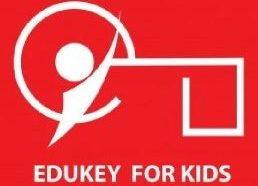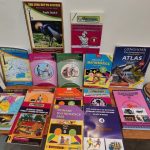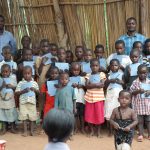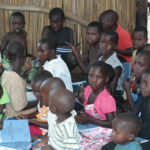Het Universal Primary Education (UPE) programma, dat in 1997 werd ingevoerd en gratis toegankelijk basisonderwijs voor alle kinderen in Oeganda vereiste, bleek een tijdlang zeer succesvol. Er zijn echter nog enkele grote uitdagingen bij het in de praktijk brengen van een dergelijk programma.
Deze uitdagingen kunnen worden teruggebracht tot vijf kwesties.
1: Kinderen worden nog steeds gedwongen om zelf in materialen te voorzien om mee te nemen (en te dragen) naar school: uniformen, schrijfwaren, boeken – maar ook toiletpapier en zelfs zakken cement. Omdat de meeste kinderen deze dingen niet kunnen betalen, gaan ze nog steeds niet (of gaan ze niet) naar school;
2: Omdat de dorpen in Oeganda zo wijdverbreid zijn, zijn kinderen gedwongen lange afstanden te lopen om naar school te gaan. Maar vaak hebben ze geen schoenen, waardoor ze op blote voeten moeten lopen;
3:De combinatie van het moeten lopen van lange afstanden, vroeg opstaan om op tijd op school te zijn en vaak weinig te eten hebben, zorgt voor uitputting en slechte concentratie in de klas;
4: Omdat schoolgebouwen vaak niet voorbereid zijn op het faciliteren van de instroom van leerlingen, resulteert dit in overvolle en slecht onderhouden klaslokalen;
5:De toestroom van leerlingen, samen met onbetaalde salarissen, resulteert in slechte werkomgevingen voor leraren – wat demotiverend werkt. Daardoor zijn leraren zelf vaak ondergeschoold en niet voorbereid op de enorme hoeveelheid leerlingen.
|
Problemen |
Oplossingen |
|
1. Kinderen gedwongen eigen materiaal mee te nemen |
Van materiaal voorzien – korte termijn |
|
2. Kinderen moeten lange afstanden lopen, op blote voeten, om naar school te gaan |
Schoenen doneren – korte termijn |
|
3. Vermoeidheid en slechte concentratie wegens te weinig goede voeding |
In maaltijden voorzien – korte termijn |
|
4. Te drukke en slecht onderhouden klaslokalen; |
Scholen helpen om hun gebouwen te verbeteren – korte termijn |
|
5. Slechte werkomgevingen voor leraren – resulteert in gedemotiveerde en laaggeschoolde leraren |
Leraren onderwijzen, trainen en begeleiden. – korte termijn |
Hoewel al deze uitdagingen op overheidsniveau zouden moeten – en het meest effectief zouden zijn – weten we dat dit vaak te veel tijd kost, ervan uitgaande dat er überhaupt ooit voor gezorgd zal worden. Wij willen het verschil maken van onderaf: met een eenvoudige, zeer praktische basisaanpak. Door het verstrekken van schoolmaterialen, schoenen en minimaal één maaltijd per dag kunnen we op korte termijn een bijdrage leveren die toch een blijvend effect kan hebben. Door onze doelstellingen voor de langere termijn, zoals het verbeteren van schoolgebouwen en het opleiden van leraren, in gedachten te houden, kunnen we streven naar een grotere, ambitieuzere oplossing: de oplossingen stap voor stap naar een dieper niveau brengen.
Voordelen en resultaten
De projectdeelnemers in Kampala, Mukono, Wakiso, Mpigi, Masaka en Rakai en de aangrenzende districten zullen profiteren van het project.
Deelnemers
Workshoptrainingen en seminars zullen deelnemers helpen bij het verwerven van capaciteitsopbouw, kunstnijverheid, enz. Dit zal niet alleen de inkomsten voor de deelnemers zelf verhogen, maar ook voor de familieleden van de kwetsbare groepen.
Familieleden
Er zullen meer kinderen naar school kunnen gaan, vooral de weeskinderen en andere kwetsbare kinderen.
Gezondheid
Een betere gezondheid zal worden bereikt dankzij de beschikbaarheid van voedingsprogramma’s en de verspreiding van fruitbomen in de gemeenschappen. Een betere gezondheid zal ook worden bereikt dankzij onderwijs op het gebied van hygiëne en sanitaire voorzieningen.
In het algemeen
We streven ernaar dat meer mensen kunnen lezen en schrijven na het volgen van de alfabetiseringscursus voor volwassenen. Als volwassenen ook leren lezen en schrijven, vergroot dit hun kansen op het vinden van een baan. Daardoor zou het gemeenschapscentrum de toegang tot informatie kunnen vergemakkelijken, via internet, boeken, workshops en educatieve bijeenkomsten
Om de duurzaamheid te garanderen, zal de gemeenschap regelmatig bijeenkomsten houden om de bevindingen te delen en te evalueren. Het is inderdaad onze hoop dat deze activiteiten zullen worden voortgezet, zelfs als er geen sponsoring meer is. Een deel van de kinderen die het schoolgeld kunnen betalen, zal voor weeskinderen en behoeftige kinderen zorgen, als aanvulling op de kinderen die door weldoeners worden gesponsord. De bewoners die bij het project betrokken zullen zijn, zullen door kunnen gaan met het planten van bomen, bloemen, het weven van manden, meubels, ijzersmeden en andere producten om te verkopen en geld te verdienen voor hun huishouden. Het Technisch Instituut zal de kinderen lesgeven uit gebieden die dit ondersteunen, waarbij ze meubels zullen maken terwijl ze tegelijkertijd leren. Dit meubilair zal worden verkocht om het Instituut te onderhouden. Hetzelfde geldt voor gebieden als bouwen en mechanica.
Al met al heeft Edukey for Kids een vervolgactiviteit ontworpen voor deze gezinnen, waar de hele gemeenschap van profiteert





